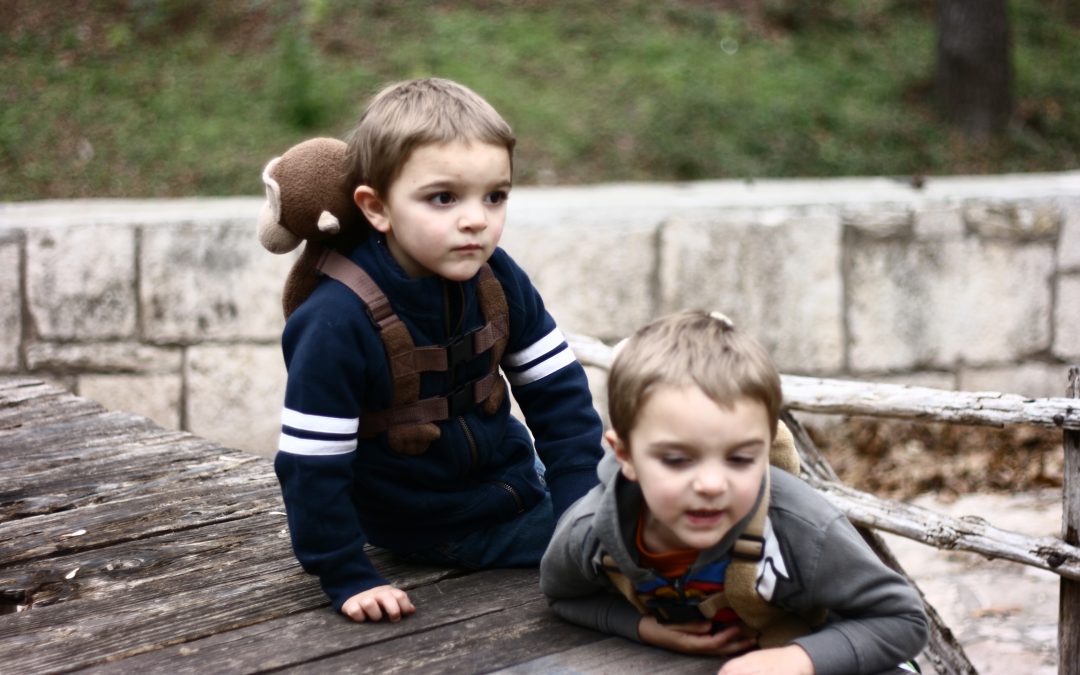
by Rachel Toalson | Crash Test Parents
My family makes quite a spectacle when we go out in public. There are eight of us, but this isn’t what drops the jaws of those around us. What drops their jaws is the fact that seven of us are male.
If or when you see us on the streets of my city, you will likely see someone lagging far behind and someone else racing far ahead. Since our twins grew out of traveling in a stroller, this has become even more pronounced. Which means, for safety measures, we had to invest in some backpack leashes.
You probably already know about this interesting invention, but I’ll tell you my take anyway. The foundation of today’s backpack leashes is a cute little stuffed animal—we have a bear and a monkey missing two ears because my twins are nothing if not destructive. These leashes have a harness you can strap to your toddler’s body. The tail of whatever animal you’ve chosen has a leash you can hold so if your kid happens to run out into the parking lot like it’s a fun game to get smashed by the tires of a car, you can steer him back from his overzealous play.
Hypothetically.
At first I felt bad about using these leashes. Before I was a parent, I’d seen other parents using them and always thought them cruel and distasteful (the leashes, not the parents).
So many things change when you have children, including your attitude about putting kids on a leash.
The first time one of my twins was released from the confines of our car and darted straight for the road while we were wrestling another kid away from the packed lunch and I, in my eighth month of pregnancy with his little brother, raced to save him from an unsuspecting driver barreling toward him, I just about had a heart attack (not to mention what happened to my pants). I didn’t think I was going to make it. (That was nothing compared to the next day, though. I could hardly move, I was so sore.)
And I knew we had to do something about our toddlers’ freedom. I knew I wasn’t getting any faster, and they weren’t getting any fewer. There were two of them, after all. One could distract both parents (it takes two to handle one of them) while the other did God knows what.
Leashes it was.
The first time we used our backpack leashes was on a family trip to the San Antonio Zoo. The leashes saved our twins’ lives seventeen billion times—and that was before we even left the parking lot.
Say what you want to say about what that indicates—I’ll probably agree. They’re impulsive boys who don’t think about the consequences of their actions. They don’t hear us unless we raise our voices (and their hearing has always tested fine). They are the most difficult of our children to manage.
So we slap leashes on them.
Child leashes make other people uncomfortable. I get it; as I admitted above, I used to be uncomfortable with them, too. But after a certain point, don’t you trust a parent to do what’s best for their kids?
Seems lots of people actually don’t. When Husband and I are walking past the local zoo’s dining area, where our kids always loudly complain about how hungry they are, people make a point to catch our eye and then, while we’re looking, shake their heads at our cruelty (maybe it’s the kids complaining of hunger, not the leashes. We’ll never know. I don’t really care.). When we are speed-walking past the alligators (leashes only protect from so much), on our way to the petting zoo, people eye Husband and me like we’re the Worst Parents Ever (we are, according to our still-hungry kids). When we’re in the middle of a crowd because everyone’s trying to see the panther that just woke up, and someone, who wasn’t paying attention, runs right into the leash, that someone scowls at us.
Most of the time, I take it like a champ. People don’t know others’ reality until they live it.
Sometimes, though, I say things that are almost guaranteed to make those scowlers even more convinced of my awful parenting. Here are a few of those things.
1. “Oh, don’t mind me. I’m just taking my kids for a walk.”
I like to save this one for the dog owners we pass who actually leash their dogs. They look at me like I’m a disgusting excuse for a parent, but do I care? The answer to that question is no.
2. “Kids are like dogs—may as well leash them.”
I’m only speaking the truth. You throw a ball to a toddler, and he will happily retrieve it for you, maybe even with his tongue out. A toddler will pee wherever he wants to, as if he’s marking his territory. You chase a kid, and he will hightail it out of there, just like any spooked dog. And if you’ve ever been kissed by an eighteen-month-old with bad aim, you know it’s exactly like a face full of dog slobber (except much sweeter, in my opinion).
3. “You should see them when they’re not leashed.”
This is all in good fun, but seriously. You do not want to see our twins unleashed. It is physically impossible for them to stay in one place. The times we’ve been brave enough to let them walk without holding onto the bear’s or monkey’s tail, we always regret that small taste of freedom.
Also, unleashed, my twins would very likely do something ridiculously stupid. They have no concept of what is dangerous and what is not, and I wouldn’t put it past them to nip at the heels of the cars speeding by. Pardon me if I don’t want them flattened beneath the tires of someone (a) going way too fast, (b) playing with their cell phone, or (c) likely both.
4. “It’s a good thing they invented kid leashes, huh? Keeps them in one place for however long you want. I use them all the time in my backyard!”
I like to say this to make scowlers think that we actually use our kid-leashes for other times besides when we’re walking in the middle of a crowded, dangerous place. (We don’t.) You should see their faces.
5. “If you loved them, then you shoulda put a leash on them.”
This is usually sung facetiously to the tune of Beyonce’s hit song, “Single Ladies.” It’s great when you’re going for surprise that quickly turns into judgment. My favorite.
6. “Oh, okay. I’ll let out the slack a little. They like knowing they have a little freedom, right? But not too much. Can’t be too careful.”
I punctuate this with a crazy little cackle, because, well, I like them to look at me like I’m crazy. Because I kind of am. And it’s funny, because backpack leashes don’t actually have slack. They’re made so that a kid can only be a few feet away from you, which is where they’re safest.
We’ve slowly trained helped our twins to better accept the reality of their leashes, and they no longer pull against them. In fact, they take their captivity like champs. And every now and then, we’ll feel a bit hopeful and try the whole freedom thing again. We’ll tuck their leash-tails into the backpack part and point out the elusive panther as we pass. It takes them only moments to do exactly what we expect them to do: divide and conquer, except it’s not so much conquering as it is disappearing so completely that we’ll spend the next half hour trying to locate them, hoping they’re not the kid on the evening news who was mauled by a tiger.
Husband will enlist the help of several zoo employees while I stay put trying not to lose any more children. And just when we’re about to lose hope, our missing son will come careening toward us, running for his life, because there’s a zoo employee trying to pick him up, and he doesn’t talk to strangers.
The leashes will not come off for the rest of the day, and our son won’t even whine or yip about it.
Hypothetically.
Say what you want to say. I know those leashes save lives.
This is an excerpt from Hills I’ll Probably Lie Down On, the fourth book in the Crash Test Parents series. To get access to some all-new, never-before-published humor essays in two hilarious Crash Test Parents guides, visit the Crash Test Parents Reader Library page.
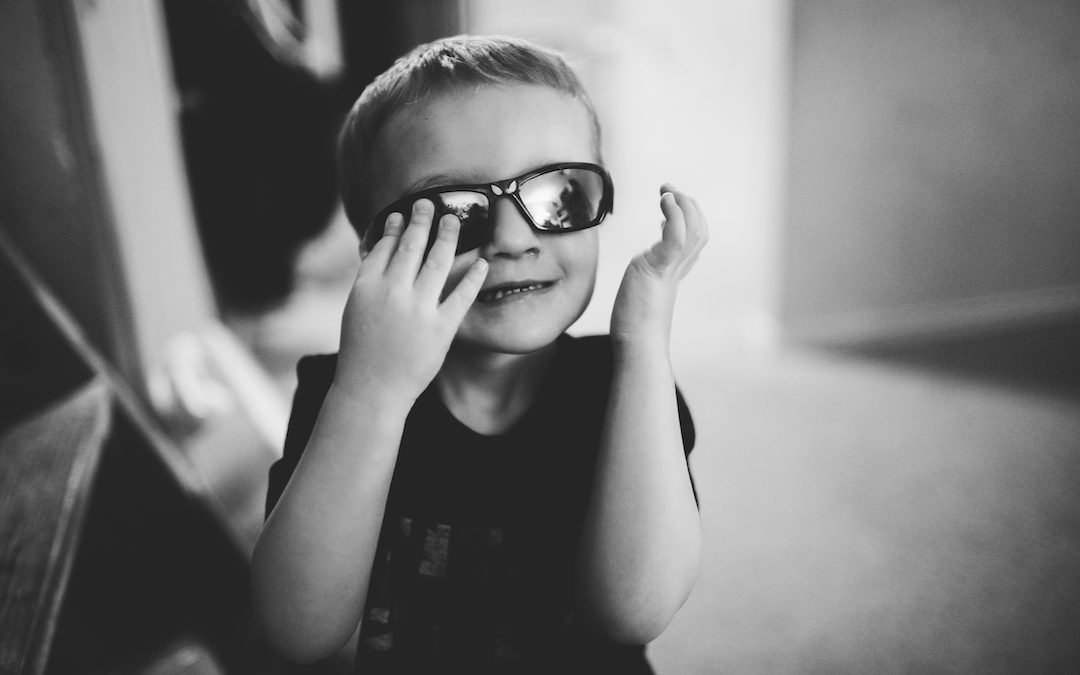
by Rachel Toalson | Wing Chair Musings
I was alone in my bedroom. It was Friday night, the time when my husband and I schedule our weekly at-home date night. He’ll pick up takeout and we’ll spread out a blanket on our bed and watch some Netflix while we eat. He was already on his way to pick up a chicken sandwich we’d share, along with some chips and queso. My boys were in the next room, reading. I usually take the time alone to write a little.
This particular night I was in the middle of what I think was a profound thought—and the door flew open. My three-year-old was there, smiling at me, effectively ejecting me from my profound thought and planting me right back in the real world.
“I want to have you,” he said.
I felt a little annoyed, but I smiled and patted the spot next to me on the bed. He climbed up and showed me the Stitch stuffed animal (from Lilo and Stitch) he had brought with him. Stitch is attached to a slap bracelet that I’m surprised still works in this house of destructive boys.
My son bounded off the bed after a few minutes, climbed into the wing chair where I normally write, and used Stitch to turn off the light.
“Did you see that, Mama?” he said. “Stitch turned the light off with his tail!” His blue eyes sparkled with a delighted gleam, and I could see his tongue smashed between his teeth.
My writing was forgotten. I had to bask in his joy, his smile, his pleasure at having turned off the light with Stitch’s tail.
He climbed back down from the chair, launched at me for a kiss, and scrambled toward the door.
“I love you,” I said.
“I love you, too, Mama,” he said as he bounded out of the room, Stitch flying in parabolas beside him.
Magic is everywhere.
I’m glad I had my eyes open to see it.
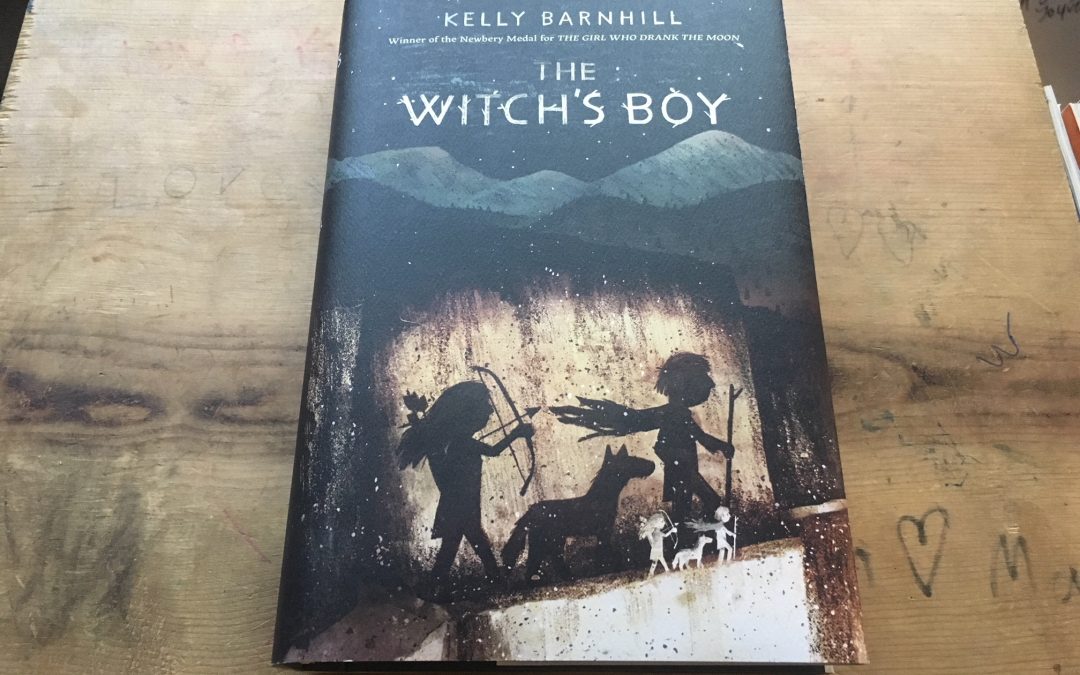
by Rachel Toalson | Books
If you know my taste in literature (I tend toward the lyrically written books), it might not surprise you that I am a hardcore Kelly Barnhill fan. I actually jumped on the bandwagon of hardcore fan after she won the Newbery award last year for The Girl Who Drank the Moon; I immediately fell in love with her writing style and her stories.
And thankfully, she had another delightful middle grade book for me to read: The Witch’s Boy. First I borrowed this book from my library, but I loved it so much I had to buy it for my home library, knowing that this is a book I will read again—possibly every year. I loved it at least as much as The Girl who Drank the Moon.
The Witch’s Boy is a middle grade fantasy about magic, kingdoms, and heroism. It was sweet and intriguing and absolutely beautifully written (I’ll share a couple of examples below).
Here are three things I enjoyed most about it:
The language. Of course, as a poet, I’m a sucker for books with beautiful language. Barnhill has such a satisfying style of writing (for me), a lyrical language that sounds like poetry on the page—proving that you don’t actually have to write a novel in verse; all you have to do is infuse poetry into your prose. Her descriptions, her metaphors, the way she encapsulates action in the perfect collection of words…I feel like I’m gushing, so I’ll stop. Just know that it’s beautiful.
The characters. Ned and Áine were such starkly drawn characters, and you wanted them to succeed in whatever they did. They were strong, resourceful, and brave—the kind of heroes you root for when the going gets tough.
The world. Barnhill also has a wonderful imagination and creates these elaborate yet simple worlds with witches, old queens, secret kingdoms, magic stones, bandits marked by tattoos. Spending time in her world is delightfully fun.
Here’s the first line of The Witch’s Boy:
“Once upon a time there were two brothers, as alike to one another as you are to your own reflection. They had the same eyes, the same hands, the same voice, the same insatiable curiosity. And though it was generally agreed that one was slightly quicker, slightly cleverer, slightly more wonderful than the other, no one could tell the boys apart. And even when they thought they could, they were usually wrong.”
I was immediately drawn in to this story, which might possibly be because I’m the parent of identical twins. And what Barnhill writes is entirely true.
Here’s another example of Barnhill’s beautiful language:
“The sun hovered over the edge of the sky, lurid and fat as an overripe peach, before slumping toward night. The light oozed overhead in garish colors; it was a sky that announced itself.”
Can’t you just see it?
Oh, how I love this book. You probably will, too!
The above is an affiliate link. I only recommend books that I personally enjoy. I actually don’t even talk about the books I don’t enjoy, because I’d rather forget I ever wasted time reading them. But if you’re ever curious whether I’ve read a book and whether I liked or disliked it, don’t hesitate to ask.

by Rachel Toalson | Crash Test Parents
Husband and I both own businesses and work from home. He runs a successful video marketing company and I run a writing business. This means we see a whole lot of each other, which is great. We get to each lunch together and hang out together, and we get to talk to each other about the crazy things our kids are doing today, and we get to tag-team on the child-raising so our sons get to spend as much time with their daddy as they do with me.
It’s not lost on me how fortunate we are to do this. I’m very grateful.
We have three sons in school right now. Someone else takes care of them all day, and I’m only responsible for the three who remain at home, which is responsibility enough, since two of them are Dennis-the-Menace-on-steroids twins.
I don’t usually work when I’m on duty with the kids, but lately I’ve been using about a half hour of my time with them in the mornings to catch up on some communication tasks and other things that have been falling through the cracks. And everyone knows that once you start making exceptions, the exceptions start to feel like a rule.
Kids, of course, have made it super easy to work from home. Everybody should try it. Especially if they like walking down the road toward insanity only to see it waving maniacally—already behind you.
Kids actually make it very difficult—if not impossible—to work from home.
For those who are considering this life change, here are some reasons why working from home is one of the most difficult career challenges I’ve ever faced:
1. Their definition of what is important information is terribly skewed.
They want to tell me that they had to go poop and that their poop was dark brown and stinky, but I’ve got an email to send, and then after I send it, I realize I’ve totally used the wrong word, substituted “close” for “clothes,” and there’s no way that magazine editor is even going to open the essay I sent along with my email, because I used to be an editor once, too, and mistakes like that aren’t tolerated from freelancers.
They want to tell me what colors they used to color Elmo in their coloring book; and they want to tell me that the hole in their jeans just got bigger, while they were watching—they didn’t even touch it (yeah, right); and they want to tell me that they would like me to put the baby in his high chair so he’s contained, because they really want to make some snowflakes with the shape blocks, and he’s crawling all over their masterpieces and messing them up.
I know all of this is important in the worlds of children, but seriously. I’m trying to work here, kids. Figure it out.
That’s just for my morning on-duty time. Then comes the afternoon off-duty-I’m-now-working time.
Husband and I have an arrangement—which our sons know about—where the kids will stay out with whomever is on kid duty and will not burst into our bedroom, which is the location of our home office, while the other parent is working. And sometimes our kids do well with this arrangement; sometimes not so much. It’s not unusual that they will come bursting into my room, while I’m on my working shift, to tell me that their friend has come over to play. Not life-threatening information.
Sometimes they will interrupt my work to say the grass is green, which is, arguably, something to celebrate in South Texas. Sometimes they slam in and out of the door—three or four times in fast succession—to say they had a donut right before recess today. They’ll burst in to tell me that they got to play this one computer game at school and they built up a section of blah blah blah.
Now, I do love that they want to tell me all this, because I enjoy talking to my kids as much as anybody else does. But I’m also a writer. And when it’s my time to write, I want to be able to write. What happens when they surprise me with a visit is that I will usually have to rewrite a thought, maybe even all the ones before it, because I require absolute concentration when I’m choosing words for a page. So a five-second interruption just cost me half an hour of writing.
2. They don’t stay put.
My twins are the best escapists around. I have some amazing stories to tell on their application for gifted and talented when they go to kindergarten. They have escaped so many prisons (not really prisons; you know what I mean) in astonishing ways.
For a while, we had a lock on our back fence, which ensured that they were contained in our backyard. And then we decided that they were getting older and maybe we could try something new and see if they actually stayed where they were supposed to stay (this is always a bad idea on the part of a parent), without the suggestion of a lock—and, also, it was really annoying having to unlock the back fence when the boys’ friends wanted to come follow them into the backyard and jump on the trampoline. We didn’t like those friends trampling through the house because they were so numerous.
So we took off the lock. And the first day it was off, the twins escaped into the front yard (I was watching). I brought them back to sit in their booster seats as a consequence and told them that if they were going to break the rules, they weren’t going to be allowed out back. We’d try again tomorrow.
We tried again tomorrow. And the next day and the next day and the next day, and every day, for two months, after that. They would not stay no matter that it meant they would be sitting in their booster seats until lunchtime and wouldn’t be able to go out and play (trust me, it was probably worse for Husband and me).
So the lock went back on.
We know it’s just a temporary fix, because they’re the kids who figured out they could pick their bedroom lock (put in place to keep them from wandering at night and killing themselves with vitamin overdoses or worse) with the prong of a box fan. I’m waiting for them to figure out how to pick the lock on the fence, which will require a more creative solution. At least they keep our creativity flowing.
3. They like to close laptops and press buttons.
My fifteen-month-old is really good at this, because I usually like to sit on the floor so he can see me and come hug me whenever he wants. So, yeah, I know this is my fault. An email I tried to send the other day had an extra “lk” at the bottom of it. I caught it. But proofreading has taken on a whole new dimension now that the kids make it so easy to work.
My twins will randomly walk up and close my laptop, usually when I’ve left it for just a second because I needed to take a bathroom break or I’m changing out a load of clothes from the dryer. And, as it usually happens, they’ll close it before I’ve saved anything, so I’ll have to start over. Or the computer won’t even start up because everything my twins touch turns to dust.
Fingerprint technology would be nice. It would at least delay the twins by a few months, before they figured out how to hack it.
4. You won’t hear anything from them for an hour, but as soon as you’re on a business call, their volume control malfunctions.
This happens more frequently to Husband than it does to me, mostly because I’m a recluse and hide away in my office so I don’t have to see anyone or go anywhere or talk on the phone at all. But poor Husband. Our kids will be perfectly content playing with the wooden structures, be building a track their cars can drive down, be quietly putting together a puzzle, and Husband will see the opportunity to return a quick business call that he didn’t have time to return during his shift. And as soon as he walks into the kitchen to talk, as soon as the person on the other end answers the call, the boys lose their minds.
It’s a lovely, mysterious phenomenon.
5. They need something.
It never fails. As soon as I set my timer for the half hour I’m going to work (because I don’t like to go over that time or it sets an unhealthy expectation for how much work can be accomplished, and before you know it your whole morning is gone), one of the kids will yell from the bathroom that he needs more toilet paper, or someone will say he’s hungry, or the baby will try to crawl up the stairs.
In spite of all this, I still manage to get quite a bit done for my business during that thirty-minute window—on average, I send one email with a few misspellings. It’s about all I can ask, and I’ve gotten used to it. So, kids, don’t worry about your interruptions.
We’re just subtracting it from your college savings. Which, judging by all the work I got done this morning, will be a negative balance by the time you get there.
This is an excerpt from Hills I’ll Probably Lie Down On, the fourth book in the Crash Test Parents series. To get access to some all-new, never-before-published humor essays in two hilarious Crash Test Parents guides, visit the Crash Test Parents Reader Library page.
(Photo by Lauren Mancke on Unsplash)
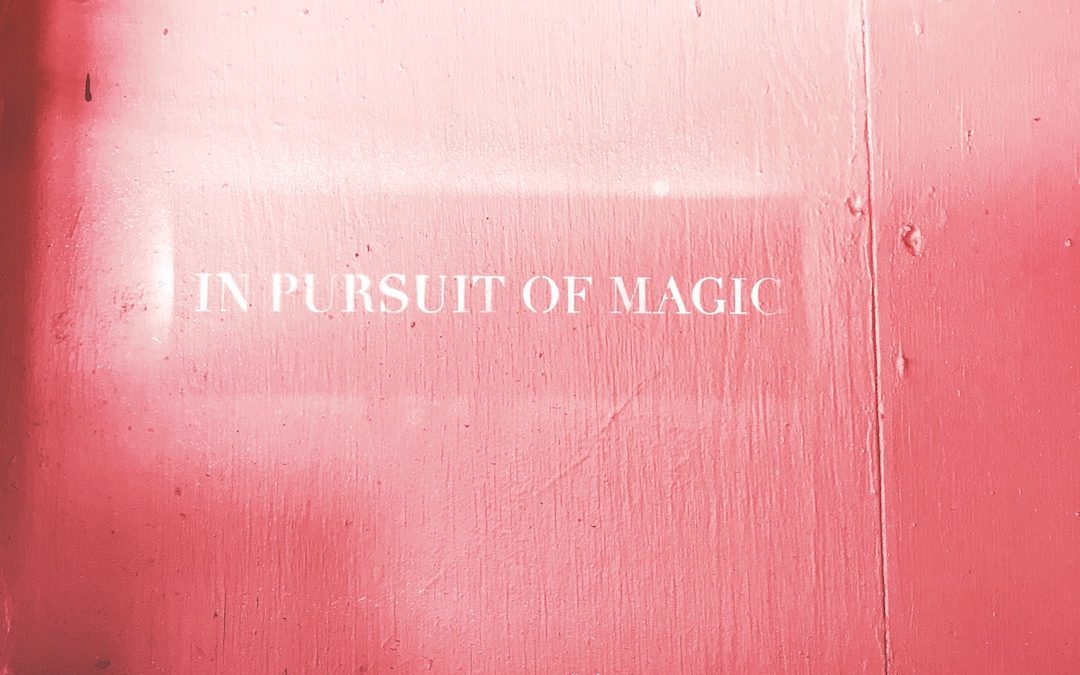
by Rachel Toalson | Wing Chair Musings
The world is breathtaking.
The other day, my family and I were driving to church, and the clouds looked as though they were a rolling white and gray ocean, a collection of froth and waves, a layered landscape that begged my attention. My husband was driving, so I snapped pictures, which, of course, did not do the beauty justice. I am no Oliver Pike or Andreas Feininger, though I am a great admirer of nature photography.
I pointed out the spectacle to my children, who paused their backseat fighting to express their awe (they are as enamored with the natural world as their mother).
“It looks like an ocean,” one of them said.
“It looks like we’re driving under the ocean,” another of them said.
“It looks like…” Another could think of nothing to add.
“Like we’re driving upside down, under a sea of gray waves,” I said.
They all laughed at the image—driving upside down!—and agreed.
The clouds, that day, looked like magic. (The interior of our car also felt like magic; my sons did not resume their argument after my interruption. Maybe the clouds really were magical.)
I believe that everyday magic (one might call it miracles) exists everywhere—we just have to know how to look for it. We simply have to open our eyes, fasten them on a point, let the wonder steal into our bones and take us where we have not been before.
I see magic when one of my boys brings me a flower
I smell magic when my oven is baking homemade brownies
I feel magic when my husband gives me a head massage after a headache-y kind of day
I taste magic when chocolate melts in my mouth
I hear magic when a symphony plays
The world doesn’t always seem like the most interesting thing; we can spend days and weeks and months feeling like we always see or hear or taste or feel or smell the same old things. We have to intentionally take notice of its radiance to notice this everyday magic, which does not announce itself but often flutters in on a whisper.
We see everyday magic when people are kind to each other, when a story is read to a child, when love wins (love is always a magical thing).
All it takes to witness everyday magic is to see it—to say, “Ah, look. There it is.”
There it is. Do you see it?
(Photo by Karly Santiago on Unsplash)
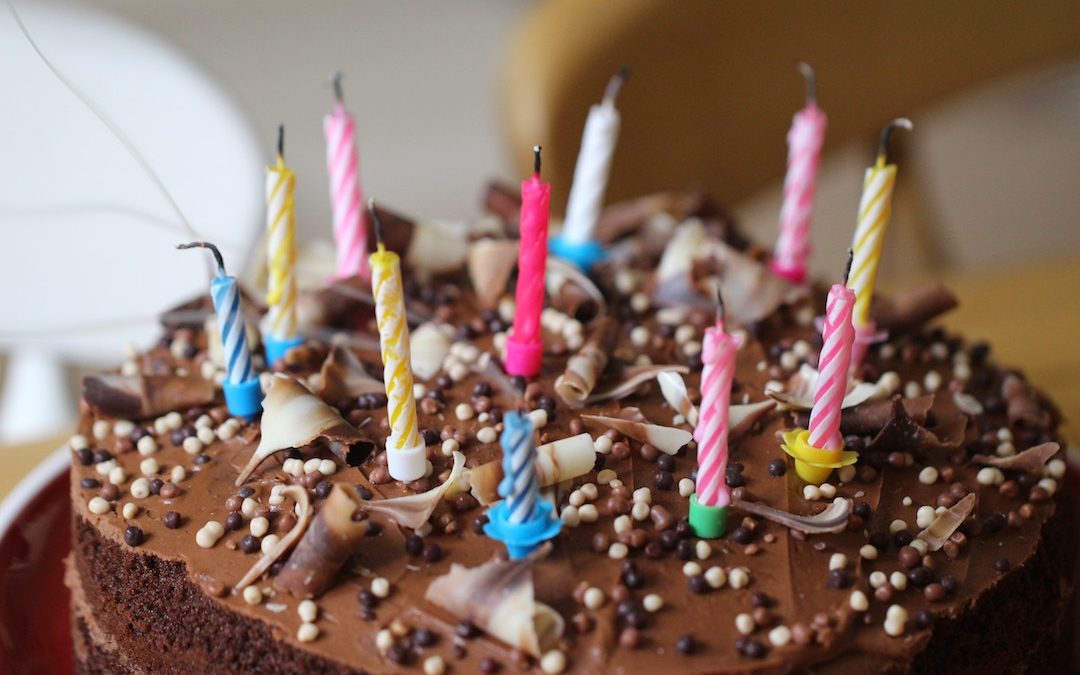
by Rachel Toalson | Poetry
Walls, Bouncing off the
They are wired from
a birthday party. Will we
ever get to bed?
Sugar High
Laugh, laugh, cry, cry, laugh,
cry, the emotional turns
of a sugar high.
Birthday Party
Madness all around,
kids coming in and out. It’s
a birthday party.
These are excerpts from Life: a definition of terms, a book of haiku poetry. For more of Rachel’s poems, visit her Reader Library page, where you can get a couple of volumes for free.
(Photo by Lorene Farrugia on Unsplash)
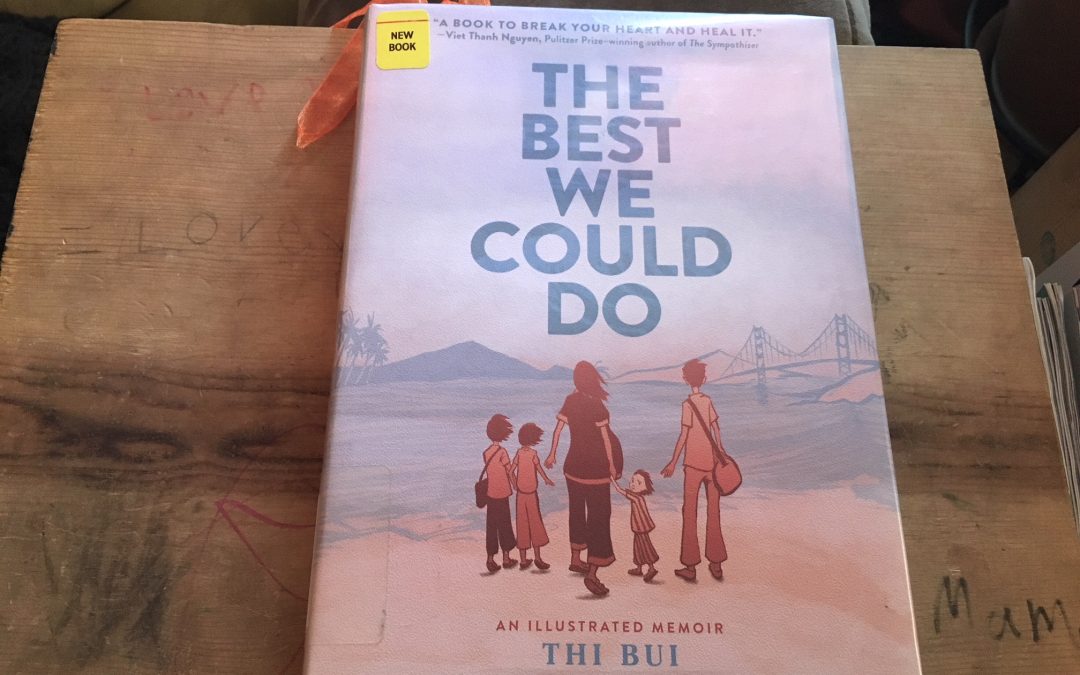
by Rachel Toalson | Books
Recently I read a memoir that was completely different from any other memoir I’d ever read; it was a memoir written like a graphic model.
Thi Bui’s The Best We Could Do is an illustrated memoir that examines her relationship with her mother and father, both immigrants from South Vietnam. It was lovely, engaging, and unique.
Here are three things I enjoyed most about it:
- The history. This book detailed a little-known history of the Vietnam War: that of mothers and fathers and families. In sharing her parents’ beginnings, Bui shed light on where her parents came from and how that shaped who they were.
- The sentiment. It was embodied in the title: the best we could do. Bui acknowledged that her parents made mistakes in raising her and her siblings, but she wrote from the perspective of a parent herself, a perspective that said she understood their mistakes, forgave them, and appreciated who she had become because of them.
- The pictures. This was the first time I had read an illustrated memoir, and I really enjoyed it. Bui provided the right balance between pictures and text, and it made for a fantastic and fast read.
I am so glad I picked up this book, and I’m hoping that Bui will do more books like it.
The above is an affiliate link. I only recommend books that I personally enjoy. I actually don’t even talk about the books I don’t enjoy, because I’d rather forget I ever wasted time reading them. But if you’re ever curious whether I’ve read a book and whether I liked or disliked it, don’t hesitate to ask.
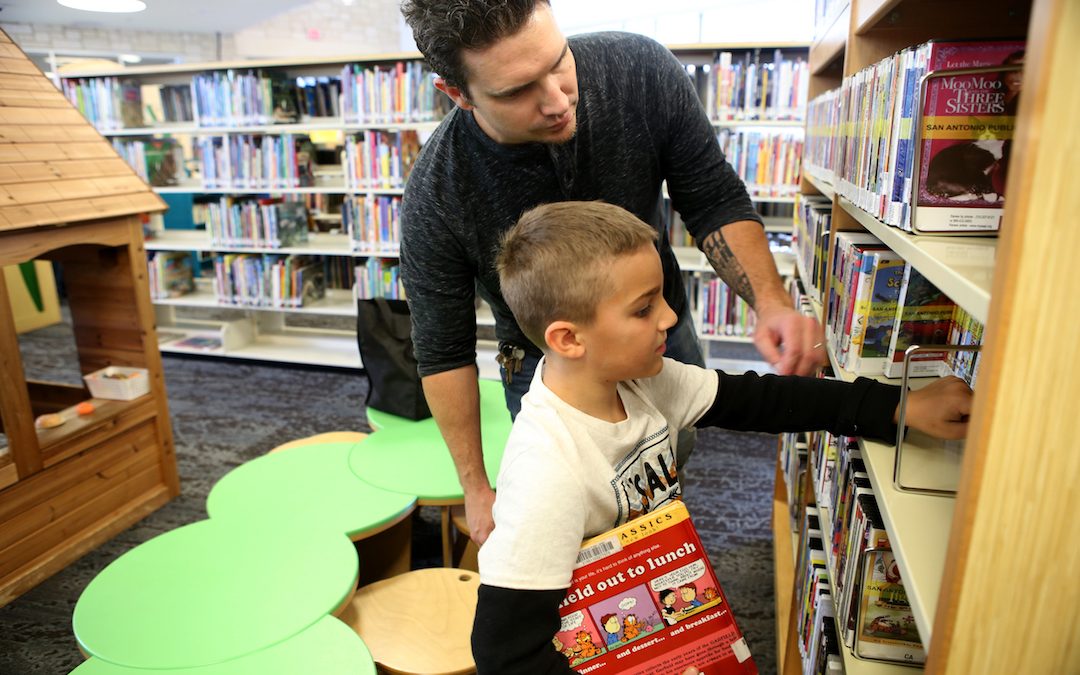
by Rachel Toalson | Crash Test Parents
Recently Husband and I went to visit my mom, and practically the whole time he and my sons were outside playing baseball. The boys had fun until the other team scored a run or they thought they should have another chance at batting but the game was actually over.
Truthfully, most of the games ended in tears (but they didn’t start that way).
After one such game, when I could hardly keep my eyes from rolling out of my head because of the broken hearts (they were exceedingly loud) from the losing team, Husband plopped down in the seat next to me and said, “I love playing with them.”
“Even when they whine and complain after the game’s over?” I said.
“Yeah,” he said.
And I was struck, right there on my mom’s front porch, which faces the open yard and, across the street, a cornfield, by how much children gain from the involved presence of their dads (not for the first time).
Dads offer something incredibly important to their children, and here are some of those things:
1. A confirmation of their identity
This is the most important thing Husband does for my sons. It’s the most important thing, in my opinion, that any dad can do for their kids. A dad can reinforce to their children the truth that they are important, they are beloved, and they are worthy of the love they are lavished.
I think here of my own background, where a dad did not stick around. What it spoke to me, the hole I carried around—and still carry around on my worst days—is that I was not worthy of his love.
Dads, with their continued involved presence, affirm who children are; they speak into their lives in an authoritative way, one that stands strong against the arrows those children will take when they are someday grown. Dads tell their children, through their involved and interested presence, that those children are worth being loved. And this means the world to a kid.
2. A role model
Dads model for boys who to be. Boys will try to walk like their dads and talk like their dads and sometimes even think like their dads. But dads also provide an essential model for their daughters, too. They show girls how to be loved. They show their daughters that they are not loved for their beauty but for who they are—and in a world like ours, this is an essential message to pass on.
Dads show boys how to treat girls, and they shows girls how to be treated by boys.
3. A voice of wisdom
Moms are wise and capable. Dads offer another dynamic of wisdom, a reinforcement, an underlining of that wisdom. A mom can exemplify to her children how to treat others, how to be kind and loving, how to live with courage and strength. But when that message is reinforced by dads, it grows spectacular wings.
I’m exceedingly grateful to the man in my life and all the hands-on fathers like him. Thank you for what you do.
(Photo by Helen Montoya Henrichs.)
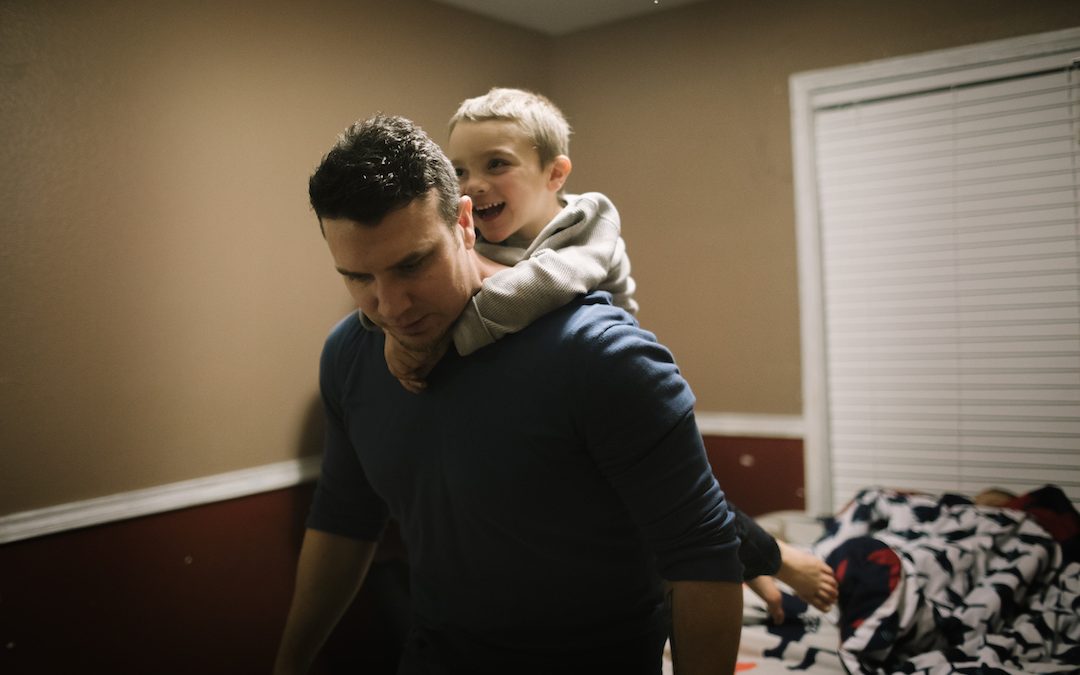
by Rachel Toalson | Wing Chair Musings, Wing Chair Musings featured
We all gathered on the same two acres where my sister and brother and I grew up, though the house we lived in for seven years no longer sits on the land. Another marks its place instead: wider, longer, newer.
Fajita meat smoked on the island in the middle of the kitchen. A bowl of my mom’s potato salad hugged the edge of the counter, a metal spoon jutting out of it. A cake, frosted in white, covered in candy mustaches, bleeding red along the sides, waited to be cut.
It said, “Happy Father’s Day.”
I’m not a cake person, but my eyes would catch on those words every time I passed by the island. Happy Father’s Day, it said. Happy Father’s Day.
All day long I felt something pinching at the corners of my existence. All day long I shoved it back down where it belonged, hidden and safe in a heart that had come to terms with this, truly. All day long I tried to forget about my rocky relationship with the word “father.”
But it’s not something a fatherless child can so easily forget.
///
My memories of my father, especially the first ones, are vague and hazy and uneven. I remember looking up to him and marveling at how tall he was, like a giant. I remember watching everything he did with awe and adoration, like he was the very definition of a hero. I remember how he smiled, his eyes crinkling up in a way that made you want to do whatever you could do to elicit another, because they were so few and far between.
I remember hands that would hold me when crossing a road, so I would be safe, and hands that would redden my skin in successive smacks for crying harder when he threatened to give me something to cry about. I remember tall glasses of milk with butter biscuits and the mess of a kitchen my mom would have to clean up after my father decided to cook. I remember a bright yellow truck and swimming in a murky lake and words that could sting worse than his hands.
I remember standing beneath a cover of trees, the wind pulling at my dress, whipping it against my knees and calves, while he climbed on the back of his motorcycle. I asked him when he would be back. He said nothing, only smiled, blew me a kiss, and drove away. I watched him until I could not see that motorcycle anymore, until I could not see him anymore.
And then I remember gone.
///
At my mom’s house, the fathers stood around outside, talking over a barbecue pit. They chased little ones inside, saving them from plummeting off a couch. They bent over a game of croquet and taught boys how to putt.
Midway through the day, I ambled outside and saw my brother-in-law, leaning into a tire swing, helping my niece onto it. He pushed her in gentle circles, and she giggled. She asked him to push her again, and he did, this time higher. Her face changed, and her hands wrapped tighter around the rope. She made a little noise, startled by the feel of flying higher.
He heard the noise and stopped her, reassuring her she was safe. She climbed down and ran off across the wide yard. His eyes followed her, and, when her face grew too red and sweaty, he carried her inside for a drink of cold water.
I watched, and I wondered.
I wondered what it would have been like to have a dad who noticed. A dad who noticed that your face changed almost imperceptibly, because you were trying hard to be brave, but the truth was you were scared. I wondered what it would have been like to have a dad tell you it was okay to be afraid, that he still loved you even though. I wondered what it would have been like to have a dad who saw your thirst and met it.
My dad noticed the shortcomings and the mistakes and the journal he once took it upon himself to read. He told us all the ways he would have raised us differently if he’d been the one to keep us, instead of our mom, who, he said, coddled us too much. He saw our thirst and called it complaining. Neediness. Weakness.
Ridiculous. Inconvenient. Too much.
The words needled into my skin, becoming three completely new ones: Not. Good. Enough.
///
It took him a long time to come back, but he did. He came back and then he went away again, and then he came back and went away again. After a year of his being gone, my mom told us we were moving.
To Ohio, she said.
To be together, she said.
Like a real family, she said.
We cried and protested, and when the crying and protesting didn’t work, we despaired and hated. We didn’t want to leave our friends, our home, our security. We’d never even been out of the state of Texas, but we went in the end. We had no other choice. Being a real family was too alluring.
My mom settled us into the largest house we’d had, or at least that’s how my memory tells it, even though I can’t remember the rooms all that clearly, because a veil dropped over my memory that year, as if my life had been a candlelit movie set until a move to Ohio turned it into a darkened theater, with only flashes of clarity.
But what didn’t happen in the Promised Land was my father coming home. We weren’t a family. Nothing changed.
My father’s absence in that year carved a jagged hole in my heart. I tried to be the best I could be, so he would come home. I tried to make the best grades, tried to have all the right friends, tried to be perfect, tried to be less of an inconvenience, tried to prove I was worthy of love. But nothing I did could bring him home.
We left Ohio with failure whipping across our backs, and I would work harder in the years that came after, always trying to prove I was somebody. Somebody great, somebody noteworthy, somebody who deserved a loving father who stuck around.
The harder I worked, the larger the hole grew and the larger the hole grew, the harder I worked. It was a cycle that could not be tamed.
I fell fast and furious into it.
///
I was a seventh grader when my stepdad showed up at the front door with two large pizzas and met us for the first time. He was a young blue-eyed buzz-cut-haired man who treated my mom like she was something special, and as much as we loved that about him, we could not forgive him, at the time, for taking my father’s place. And we made it hard on him.
We shouted our disrespect, and we fought with our hands and our hearts and our words, and we told him we didn’t want him to live with us, never ever ever. We did everything we could think to do to make sure that our father’s space was untouched. Saved, if you will. Because our father might one day return.
It’s hard for a kid to let go of that dream. It’s hard for a kid to let another man step into the place of one who should have loved them unconditionally, recklessly, forever and always just because they shared his blood and genes and the long legs and thin lips and straight hair.
But my stepdad stuck around. He fought for our hearts. He picked up all the pieces my father left and said we could be his. We could be loved. We could be good enough.
My stepdad walked me down the aisle, and he sat in the waiting room the day all my sons were born, and he calls my sons his grandsons, even though they share none of his blood. He has shown me what it means to be a father. It does not mean abandonment and forgetting birthdays and wishing out loud in the hearing of a kid, that the kid could be different.
It means putting a heart back together with Duct tape and calling it spectacular anyway.
///
My husband is one of the most hands-on fathers I know. He cares for our children for half a day every day while I hole up and write. He plays with them, he raises them, he speaks life into them. I watch him sometimes with a mixture of love and awe, because I never knew that a father could be like that. So present. So forgiving. So involved and heroic and wonderful.
I never knew a father’s love could be so spectacularly life-changing—not just for the ones who are the recipients of it, but for the ones who are watching it unfold around them.
A father, in my world, had only ever picked up and left, moving on to another family—one that was better, easier, more worth the work of sticking around. But healing crept into my heart, watching my husband. Not just because he was a phenomenal father but also because he messed up.
He messed up. My father messed up. We all mess up.
A father has a tough job, this being a hero to the ones who look to him for truth and love and identity. Some fathers aren’t up for the task. Some are. Some try. Some don’t so much. Some step into the role and play it for all it’s worth. Some are too afraid to even toe it.
And some? They just don’t even know where to start.
///
Father’s Day. It’s not an easy day for me. I always feel a bit guilty that I only really call my father once a year, on Father’s Day. Sometimes I don’t even do that. Sometimes it’s just a text. Sometimes the whole day goes by and I’m so busy with my husband and boys that I forget to even text.
Part of the problem, see, is that my father is not the first person I think of on father’s day. I think of the man who stuck around when the going got hard and I turned into a contrary teenager. I think of the man who stood there, stoic, when I called him an idiot because he wouldn’t let me go see my boyfriend. I think of the man who spun me around the dance floor during the father-daughter dance the day I got married.
Father’s Day isn’t always a simple day in the lives of the fatherless ones. Some of us have blood fathers who gave up and called it quits, and that damaged something deep inside, told us we weren’t worthy of the effort it takes to be a dad. Some of us have fathers who left in other ways, like death or suicide or an accident that rendered him inaccessible to us. Some of us never even knew our dads.
We were hurt by our dads. We still carry the scars. Maybe we haven’t quite forgiven them.
And so when it comes time to celebrate dads, we say, oh, well, it’s just another day in my life, because I never really had a dad anyway.
But there is something I have learned in the years between that vulnerable eleven-year-old and this woman I am today, and it is this: Dads come in many different shapes and sizes, and the ones we think of on Father’s Day aren’t always the ones who scientifically contributed one half of who we are.
The fathers of our heart look like teachers and coaches and friends’ dads and stepdads and fathers-in-law and mentors. They look like the ones who step into our lives when others step out. They shape us the same as any dad should, even though they didn’t have to. They fill us. They rebuild us. They are dads.
And so, for Father’s Day, I choose to thank all those men who step into the lives of the fatherless ones and teach little boys how to be men and little girls how to be loved. Thank you for your presence. Thank you for your generosity. Thank you for your love.
Happy Father’s Day to all the fathers of my heart.
This is an excerpt from We Count it All Joy, a book of essays. For more of Rachel’s writings, visit her Reader Library page, where you can get a couple of books for free.
(Photo by This is Now Photography.)
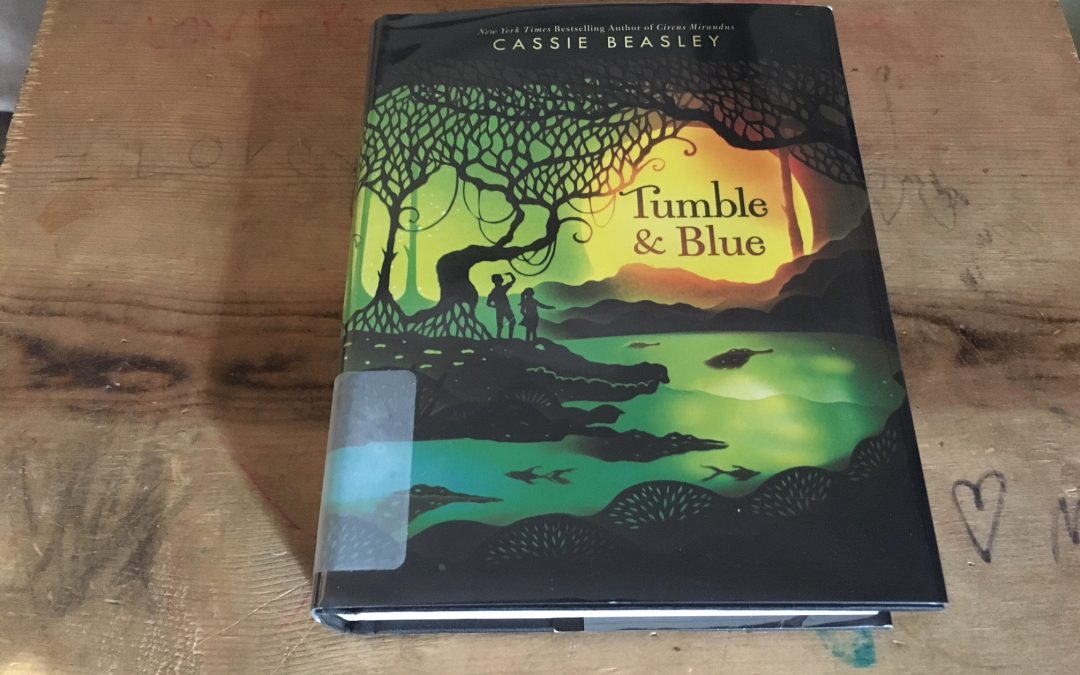
by Rachel Toalson | Books
I’ve been a big fan of Cassie Beasley’s middle grade books for a while, and it was with great anticipation and eager eyes that I picked up her latest release, Tumble and Blue.
This was a sweet middle grade story about friendship, fate, and sacrifices and included the point of view of an ancient creature of the bayou, which I found delightful.
Here are three things I enjoyed most about it:
- The characters. I loved Tumble and Blue. They both had emotional wounds, which made them three-dimensional and realistic, but they also had very distinct personalities—Tumble was the girl who wants to be a hero; Blue was the boy who always loses. What great irony to begin with. I also absolutely loved that they were a boy and a girl who could just be friends and nothing more.
- The concept. The story is based on the concept of fates—Blue’s family members are born with a particular fate that can be either good or bad, and in order to change that, they must track down a giant alligator called Munch on a red sickle moon. This concept gave the book the feel of a legend, and I enjoyed that immensely.
- The structure. The narrative was interrupted by sections written from the perspective of Munch. This introduced a sense of mystery and some tension while still propelling the story forward. And Beasley also used a bit of backstory that was relevant to the story in Munch’s excerpts. It was a great way to explain things in a way that felt natural, rather than forced.
The first line was intriguing enough to keep me reading. Here’s the first couple of sentences for you:
“From time to time, I bother to notice them.
“Tourists. They come reeking of their bug repellants and their sunscreens, and the clicker-snap of their cameras nibbles away at the song of the swamp until I wonder if they can hear it at all.
“In my memory, the humans who traveled the Okefenokee were a different sort. These new ones are less afraid. More curious. And, on the whole, they are quite a bit plumper.”
I absolutely loved the mystery and humor introduced in this first page of the novel.
Middle grade readers will love this tender tale of friendship and bravery.
The above is an affiliate link. I only recommend books that I personally enjoy. I actually don’t even talk about the books I don’t enjoy, because I’d rather forget I ever wasted time reading them. But if you’re ever curious whether I’ve read a book and whether I liked or disliked it, don’t hesitate to ask.











